By: Suzanne Lawler, Red Cross Regional Communications Manager
In late September 2024, a mammoth tropical intruder roared into Georgia and uprooted the lives of countless people, causing billions of dollars in damage. Hurricane Helene brought devastating rain, punishing winds and sparked deadly tornadoes. The storm’s fury was so profound, the name Helene was retired by the World Meteorological Organization. Through it all, the American Red Cross stood beside people, giving resources, fostering resiliency and providing hope for the future.
In the days and weeks following the catastrophic event, more than 680 people stayed in 35 Red Cross shelters across Georgia. Numbers can paint a picture, but every person has a story. Stories that spanned the state - from families who lost their homes, to volunteers offering comfort in the darkest hours, each story reminding us of the human spirit’s strength in the face of disaster.
For 86-year-old Peggy Mohr, a Red Cross shelter meant one thing: survival after Hurricane Helene.
“I could not have lived without it, I don’t believe, and I think there were others in the same boat,” she said somberly.
At the time, Mohr was living alone and quickly found herself in need of help. Her daughter, Tamara Mohr, was on the phone with her in Ohio, unable to help her mom directly.
“It was devastating,” Tamara said. “We’re watching this, and we’re in trouble. The next thing I know, she’s in trouble. I tried getting Amazon to deliver food, so she had things in place, but there was no electricity.”
The intensifying storm and loss of power marked a critical turning point.
“I knew the roof was coming off on one side—I heard the banging,” Mohr recalled.
Mohr, who relies on oxygen to survive, asked a friend to take her to a hospital in Augusta after the power went out. “They said they couldn’t take me in because there were no rooms,” she said.
Hospital staff recommended a nearby Red Cross shelter. There, Mohr found friendly faces, electricity for her oxygen machine and a Red Cross volunteer named Allean Harrington. “She looked like she might have been a little lonely, so I went over and talked to her,” Harrington said. “I think she relaxed, and she knew she could count on somebody.”
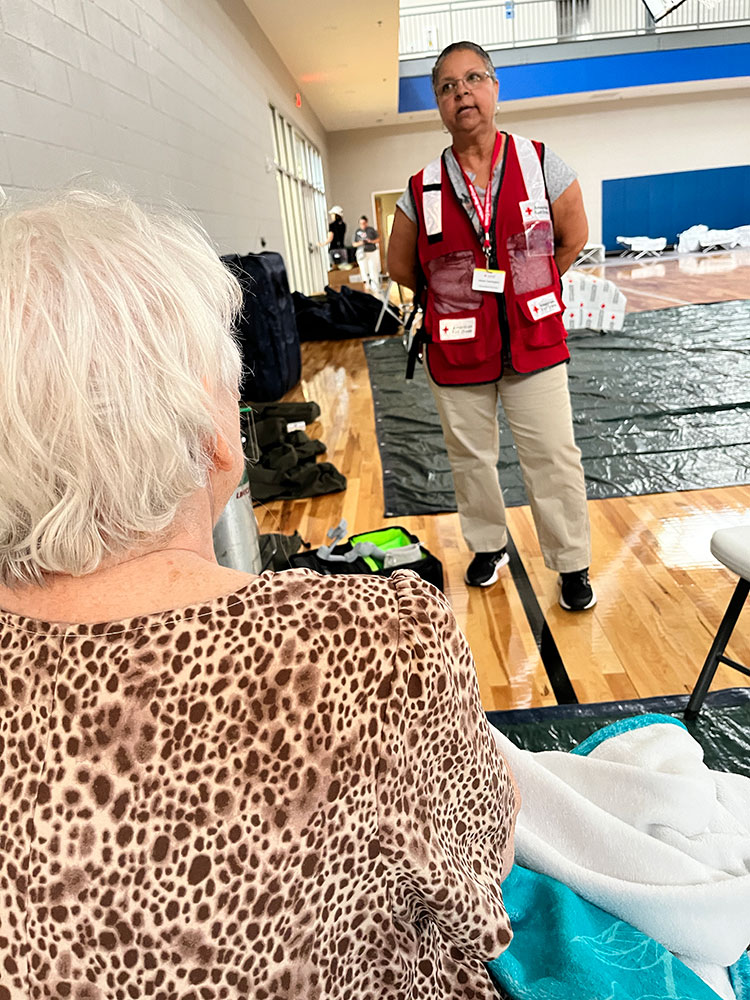
Red Cross volunteer Allean Harrington provides comfort and hope to Peggy Mohr at a Red Cross shelter after Hurricane Helene.
Mohr had some health issues that curbed her appetite; to this day, she remembers Harrington offering to make her peanut butter sandwiches. “It’s the little things that helped everybody,” Harrington recalled. “So, whatever they asked for, if we could get it for them, we did and I was just a part of all of that, including peanut butter sandwiches, coffee, or anything we could give them.”
Around 200 miles southwest of Augusta sits Hahira.
Kent Barker and his family live in the south Georgia town and didn’t want to take any chances with the storm. They left their home ahead of Hurricane Helene and stayed with a relative. Then they received news from a neighbor that would change their lives.
“It was like 11:45 p.m.,” Barker recalled. “She just texted me and said I’m so sorry your house is gone. So that was disheartening, very stressful. How do you react?”
It’s unimaginable. Barker assured his wife of 13 years, Katelyn, and his daughter that they would figure things out day by day. Forty-eight hours later, after emergency crews cleared the roads, Barker made his way back home to see the damage.
“It blew the whole ceiling down,” he described. “Between the damage of the trunk of the tree going through and all the limbs and all the water damage, we lost everything.”
Clothes, furniture, and other items that the Barkers will never be able to replace, such as furniture refinished and given to them by Katelyn’s grandmother. The Barkers are bookworms. “We’re 400 books shy of what is considered a library,” he chuckled. “I had hand-built bookshelves two years ago for my wife.”
All gone and destroyed.
The family moved in with Barker’s dad. He told them about disaster relief from the Red Cross. Barker has given blood and platelets to the Red Cross for decades, dating back to the 10th grade. But he didn’t realize the Red Cross would play a critical role in their lives after Hurricane Helene. “I knew in passing that they do financial assistance, I didn’t realize how much help they give,” he said.
In the immediate aftermath of a storm, the Red Cross helps individuals and families meet pressing needs, including safe shelter, food, emotional support, health and first aid services, emergency supplies, financial assistance and more. When resources allow, thanks to the generosity of donors, the Red Cross may provide additional long-term recovery programs to support individual and community recovery needs. The Barkers qualified for both.
“It started as a phone call and they just interviewed me and asked me about it and then they had an assessor come out to the house,” Barker explained. “The house was a total loss. We went into the local office and met with the ladies there who were very, very sweet and they gave me a card, and I got assistance on there twice.”
After Hurricane Helene, the Red Cross in Georgia provided over 550 households with direct financial assistance during long-term recovery to help bridge gaps in recovery, including the Barkers. “We were super grateful,” Barker said. “The first assistance we got helped a lot with replacing our clothes and something you don’t think about when you lose your house, you have to rebuy all your groceries as well. And that first grocery trip when you have nothing is expensive, seasonings, nonperishables, toilet paper, stuff like that, it was a few thousand dollars just to replace that, and it was a huge help.”
About 60 miles northeast of Hahira sits Coffee County. The executive director of Hope for Coffee, Devis Burnam, didn’t mince words when she spoke of the destruction the hurricane left behind. “It looked like a war zone, it was apocalyptic,” she said somberly.
Burnam says the storm came through overnight. At one point, she and her husband thought someone was trying to get into their home. It was the winds from the hurricane pushing in their doors. “We sat on the floor and then we realized we couldn’t hold it, so we rolled a piano in front of our french doors and sat there until the sun came up,” she described. “It was terrifying for us.”
According to data from the U.S. Census Bureau, Coffee County has a population of around 43,000 people, with a nearly 20% poverty rate. Burnam says that before the storm, they had a large population of underserved people.
“Our county is rural, we have like 700 miles of roads, like dirt roads,” Burnam described. “This was a disaster before, and it put it under a microscope on certain issues in our community, housing being one of them. We’re not used to 30-plus days without power and people displaced from their homes and nowhere to go because there are no rental homes, there's nothing.”
Long-term recovery grants from the Red Cross may provide funding to nonprofits and community-based groups to facilitate the expansion of current services and the creation of new programs that aid in community recovery and build resilience in the affected area.
The Red Cross in Georgia is currently managing 18 active grants, including seven that support the development of long-term recovery groups across the state.
In the case of Coffee County, over the past year, the Red Cross has given the area two long-term recovery grants.
In the immediate aftermath of the storm, people wanted to come in and help the small Georgia county, but there wasn’t anywhere close by for them to stay. Burnam called it a particularly challenging situation.
The first grant was awarded in April and helped to build 36 bunks with additional room for cots and air mattresses at the Hope Center in Coffee County. In early September of this year, Team Rubicon used the facility, and Burnam says the Amish will use the space next. The other grant will help 58 families, for a total of 250 people, impacted by Hurricane Helene. This funding will help repair 50 homes in Coffee County and build eight new homes.
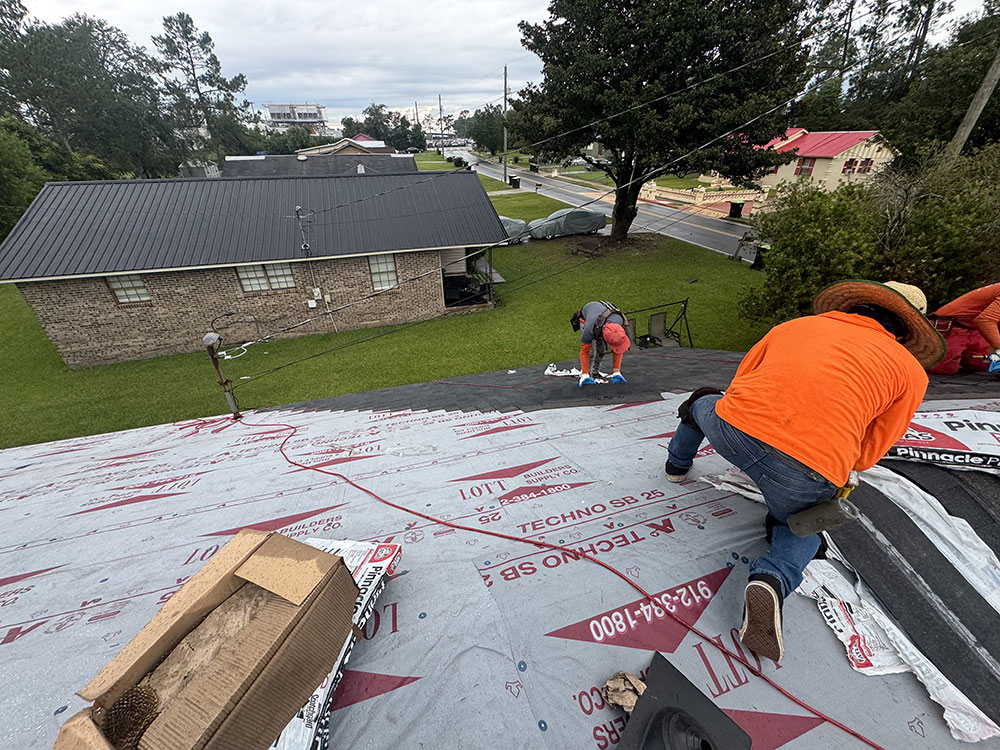
Damage to a home in Coffee County, Georgia, after Hurricane Helene.
“Coffee County was definitely hit pretty hard, and to have an organization come in and invest back into us that’s amazing,” said Valdosta City Councilman Nick Harden.
Valdosta is approximately an hour’s drive south of Coffee County, an area that also suffered damage after the hurricane. Harden owns Big Nick's Juke Joint and restaurant. His staff called the night before the storm and asked if they should come to work the next day.
“I said if you can get there safely, we’re going to feed some folks,” he recalled. “We were able to get generators, but we didn’t have power. But one thing I did have was a grill and some charcoal; it was something else.”
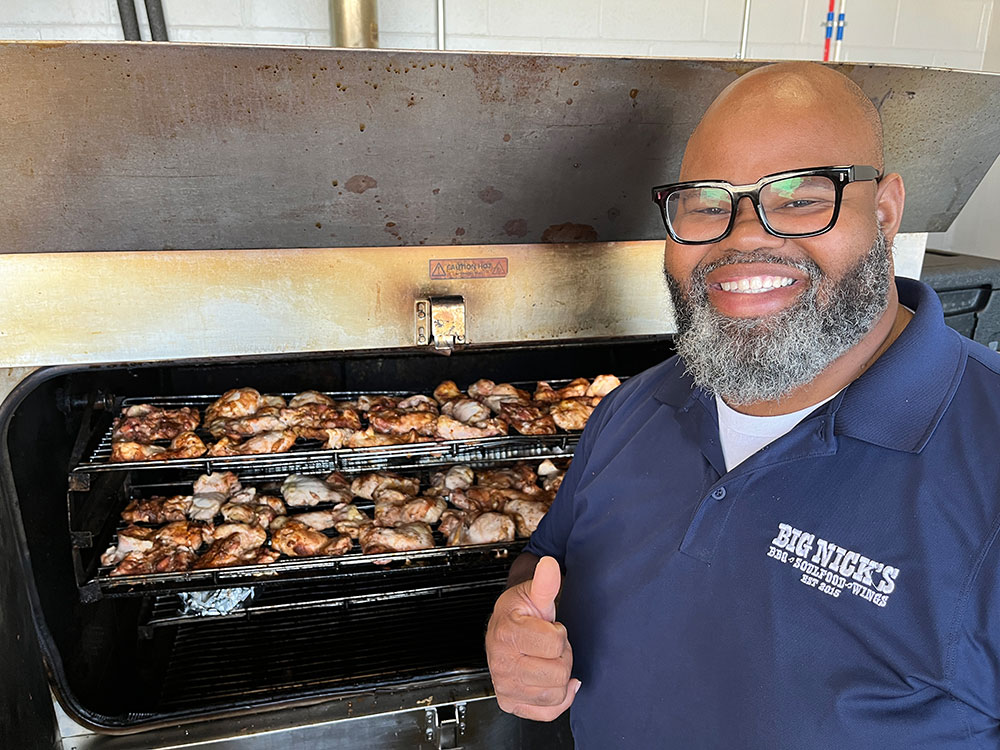
Nick Harden partnered with the Red Cross after Hurricane Helene to help feed people in South Georgia.
In the immediate aftermath of Hurricane Helene in Georgia, the Red Cross helped to provide over 750,000 meals to people recovering from the storm. The humanitarian organization works with partners like Harden. Day in and day out for weeks, Red Cross Emergency Response Vehicles would pull into the back of Harden’s restaurant twice a day to load up. Harden brought out trays and trays of hot meals ready to be delivered to outlying neighborhoods.
“We did somewhere between 30,000 meals went out and when I look back, we actually shut down the restaurant just to focus on the Red Cross,” he calculated.
Harden, who had damage to his own home, and his caring staff worked long hours to help and lift up their community, putting love into every meal.
“We had some really good stuff, you know, we had anything from smoked chicken, we did some hearty meals, we did some spaghetti, we did some turkey dressing, collards, real country cooking,” Harden recalled.
Twelve months later, Peggy Mohr is doing well. Her daughter, Tamara Mohr, now lives with her in Georgia. Tamara said the sense of community at the Red Cross shelter gave her comfort, knowing her mother was receiving good care—not just surviving, but thriving in a post-hurricane world.
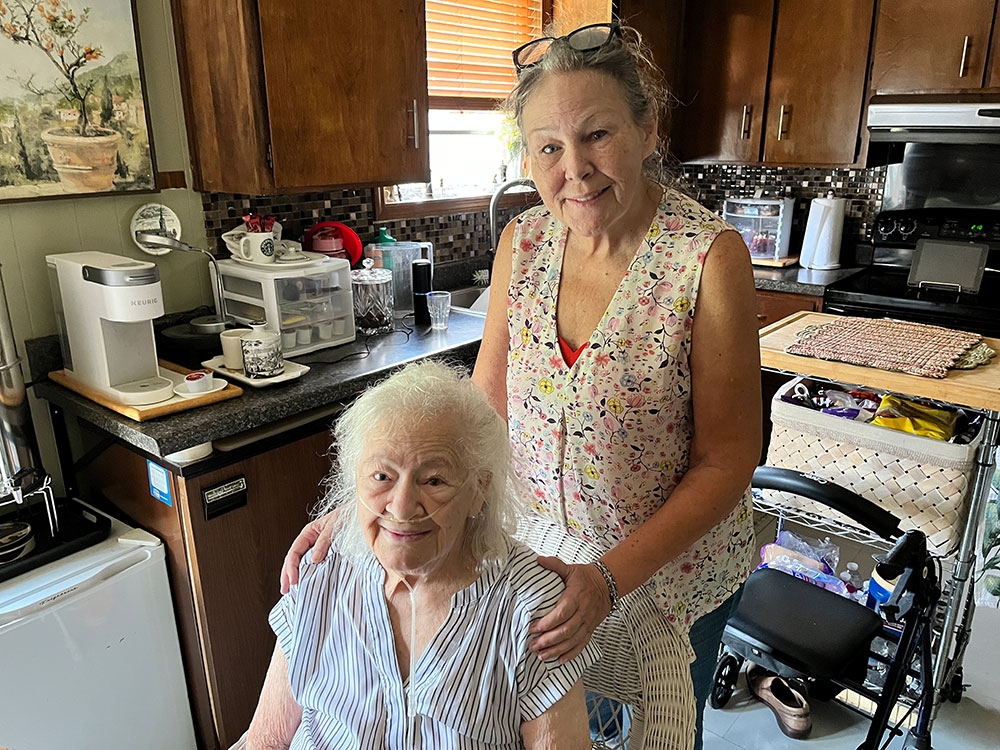
Twelve months after Hurricane Helene, 86-year-old Peggy Mohr and her daughter, Tamara Mohr, now live together in Augusta, Georgia.
Peggy would call Tamara and giggle as she shared stories of children running around the shelter, having fun and playing games.
“It was exciting. It could take her mind off things, and that actually carried her forward so she had more endurance until I could come down and help her,” Tamara said. “There were so many people injured, so many terrible things happened. She was very fortunate to go to the Red Cross.”
As for Allean Harrington, she continues to grow within the Red Cross. With her military background, she’s not only deploying as a shelter worker but also assisting with logistics.
“Looking back, I think the Red Cross is really needed, and that’s why I decided to step up a little bit—so I could share what I’ve learned in shelters,” she said. “When people experience so much devastation in their lives, they need somebody. They lose everything—or maybe not everything—but they lose touch with family. So we, who work in the shelters, become those people for them. I think when we do that, it relaxes everybody, and they begin to depend on us for support. So, I guess my biggest thing is just to keep going. Go when they need you.”
The Barkers just moved into their new home. It’s complete with new bookcases for their favorite pastime. Barker says the Red Cross provided a critical lifeline after the disaster.
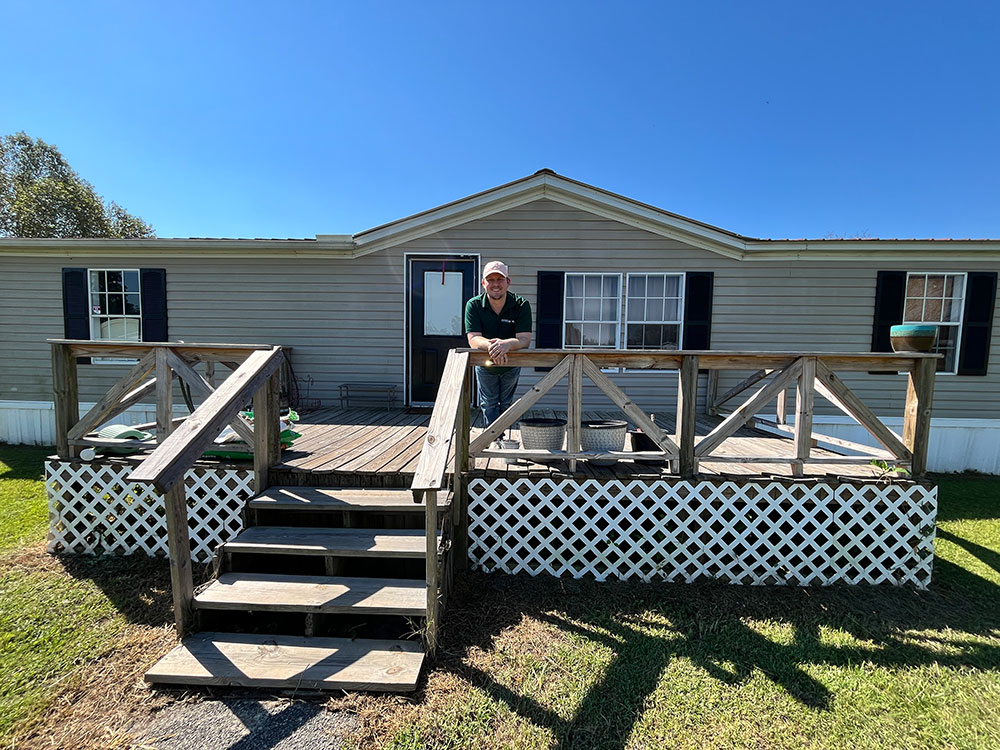
Falling trees crushed the home of Kent Barker and his family in Valdosta, Georgia. The family qualified for two rounds of Red Cross assistance and used the money to get back on their feet.
“It’s like when you’re drowning or falling and somebody reaches out a hand,” he described. “It helped us out a ton in a time where we really needed it. It’s such a great thing they do, especially for families like us and other families where you lose pretty much everything, and obviously they can’t replace the things that can’t be replaced, but the help they give, like I said, they're reaching out a hand and it means a ton.”
One year out, Coffee County is still struggling.
“We’re coming up on the anniversary this month, and you can still throw a rock and hit a tarp on a roof here,” Burnam said.
But the work is happening day by day, board by board and nail by nail. Burnam said the recovery has sped up.
“In a nutshell, that money has helped,” she said. “We identified the people who needed help; we just didn’t have the means to help them. The Red Cross has really come alongside us — not only financially but emotionally and spiritually. They’ve encouraged me personally, checking in and sending text messages. It has opened my eyes to what the Red Cross does and how they do things, and it’s been a game-changer for our community.”
The mission of the Red Cross is to prevent and alleviate human suffering in the face of emergencies by mobilizing the power of volunteers and the generosity of donors. Hurricane Helene came through Georgia in a matter of hours, but the Red Cross continues to offer relief and hope, standing beside families and communities working to rebuild their future.
About the American Red Cross:
The American Red Cross shelters, feeds and provides comfort to victims of disasters; supplies about 40% of the nation’s blood; teaches skills that save lives; distributes international humanitarian aid; and supports veterans, military members and their families. The Red Cross is a nonprofit organization that depends on volunteers and the generosity of the American public to deliver its mission. For more information, please visit redcross.org or CruzRojaAmericana.org, or follow us on social media.
Support all the urgent humanitarian needs of the American Red Cross.
Find a drive and schedule a blood donation appointment today.
Your time and talent can make a real difference in people’s lives. Discover the role that's right for you and join us today!